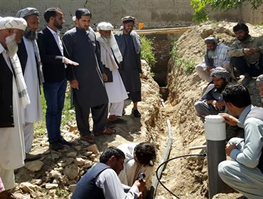Water in Afghanistan: Sector Reforms for Improved Irrigation and Water Security

Developing self-reliance through improved governance, security and economic prosperity is a top priority for Afghanistan. And key to achieving this is water security for all.
The country’s 2009 Water Law and 2015 National Irrigation Programme both recognized the critical role efficient water and irrigation management play in sustainably feeding the country’s growing population – especially amid challenges such as cyclic drought and climate change.
With funding from the World Bank and the Japan International Cooperation Agency (JICA) and technical assistance from FAO, the Government of Afghanistan has been working on sector reforms since late 2016 to improve water access for Afghan households and farmers.
These reforms contribute to the government’s commitment to adopt integrated water resources management for water security, and to increase the total area of irrigated land from 2.1 million to 3.1 million hectares.
Creating a roadmap
The reform process began in late spring 2016, when the Afghan President approved the start of a large-scale institutional reform of the water sector. The Ministry of Energy and Water (MEW), as part of the World Bank-supported Irrigation Restoration and Development Project, created a roadmap for the institutional restructuring of MEW’s Water Wing.
The Ministry of Agriculture, Irrigation, and Livestock (MAIL) followed this with complementary reforms in the irrigation sub-sector, drawing on support from JICA’s Capacity Development and Institutional Strengthening Project.
FAO provided technical support in developing implementation plans to reform irrigation institutions nationwide, aimed at strengthening subsector administration, enabling quality professional services and encouraging private sector participation.
Specifically, this includes reorganizing the MAIL’s Irrigation Directorate, establishing national-level irrigation entities and administrative branches at different levels and developing the capacity of all irrigation institutions.
“Access to water and the ability for farmers to irrigate their crops for food production is key to our country’s survival. We have to get this [reform] right,” said Dr Haseeb Payab, Irrigation Director.
Cooperation and coordination
In providing technical support on both reforms, FAO has been able to assist as a neutral facilitator of cooperation across ministries, departments and donors, provide capacity development and institutional strengthening, where needed, and foster strategic partnerships.
Progress on the reforms has been commendable given the country’s ongoing political unrest. And cooperation and collaboration between the ministries and the international donor community have increased as they recognize the importance of successfully navigating these changes.
During a meeting of the Irrigation Working Group of the Supreme Council of Land and Water, representatives from the Ministry of Rural Rehabilitation and Development, MEW and MAIL confirmed their commitment to work together to ensure a smooth transition and to provide better, more streamlined services to Afghans across the country.
International donors, including JICA, the World Bank, USAID and the European Union, are also committed to collaborating on the much needed irrigation subsector reform.
“Afghanistan had a piecemeal approach to solving water and irrigation issues in the past. Solutions looked different depending on the donor we were working with. It wasn’t coordinated… [now] we need to be wearing one uniform,” said Fahimullah Ziaee, former Deputy Minister of Water in MEW and now Deputy Minister of Irrigation and National Resources in MAIL.
Through these reform efforts, the government expects to become self-reliant in its management of the water sector and irrigation subsector by 2020.
For more information on FAO's water and irrigation work in Afghanistan, please see this video.

